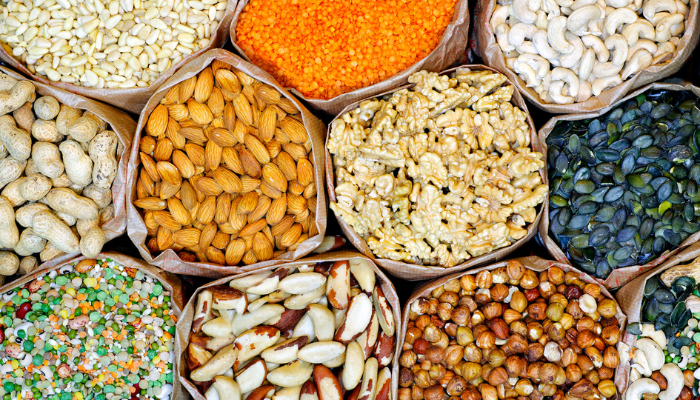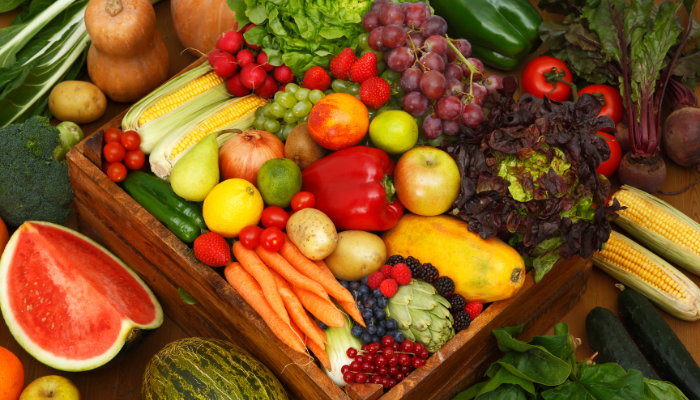The keys to a happier and healthier cold and flu season might be as close as your kitchen — or specifically, what’s in your kitchen. In addition to regular exercise, getting enough sleep, and reducing stress, including foods rich in vitamins and antioxidants regularly in your diet is a great way to support your immune system.
Before your next trip to the market, see our suggestions for the foods to include in your cart.
Get Your Fill of Fruit
Bursting with vitamins, fiber, and antioxidants, fresh fruit is an important part of a nutritious diet. Experts recommend that adults aim for at least four servings of fruit per day as a part of a healthy lifestyle.
If you have the added goal of eating to support your immune system, know that some fruits are a better choice than others. Following are the fruits that should make their way into your grocery basket and how they can benefit your immune system.
Citrus Fruit
A category, rather than a single type of fruit, citrus fruits like oranges, lemons, and grapefruit are a great source of vitamin C. Scientists believe that vitamin C increases the production of white blood cells, which are critical to fighting infections. Enjoy a broiled grapefruit — sprinkled lightly with brown sugar — at breakfast, or add slices of oranges to your lunch or dinner salad.
Papaya
Another great source of vitamin C, one papaya has 235 milligrams – more than double the recommended daily allowance. This tropical fruit is also packed with vitamin A, potassium, and calcium — both vitamin A and calcium play an important role in supporting a healthy immune system. Add papaya to your morning smoothie, toss in a fruit salad, or enjoy slices as a mid-afternoon snack.
Related: Health Benefits of a Plant-Based Diet >>
Blueberries
These little blue orbs contain anthocyanin, a flavonoid shown to strengthen your immune system. Blueberries are also a good source of other minerals and vitamins, including vitamin C. Sprinkle fresh berries over your morning yogurt, or bake them into muffins or a loaf.
Kiwis
Similar to papayas, this fuzzy fruit is packed with vitamin C — with one cup providing roughly 230% of your daily recommended intake. Nutrient-dense kiwis contain vitamins, antioxidants, minerals, and fiber. Snack on the fruit whole – both the skin and seeds are edible!
.png?width=700&height=400&name=blog-fruit-veggie-westend%20(1).png)
Eat a Variety of Veggies
Filled with minerals, vitamins, and fiber, vegetables are another key component for a healthy lifestyle. Adults should have at least five servings of vegetables per day. As with fruits, some vegetables are a better choice than others. Here are the veggies that should regularly appear on your plate and how they can benefit your immune system.
Red Bell Peppers
Oranges are often considered the winners regarding vitamin C, but experts say the title really belongs to red bell peppers. One pepper contains almost three times as much vitamin C as oranges. Fold into your morning omelet, or mix into a stir fry or fajitas.
Garlic
A staple in most kitchens, garlic is used to add flavor to a variety of dishes. It is part of the onion family, making it a vegetable. Garlic contains a variety of compounds, including alliin – which turns into allicin when it is crushed or chewed. Allicin contains sulfur, which researchers believe plays a role in garlic’s ability to help fight infections. Stir into your favorite dishes, but just make sure you are using fresh garlic instead of garlic powder.
Spinach
This dark, leafy green vegetable is high in fiber and vitamins A and C. It is also a good source of magnesium. If you don’t like cooked spinach, add baby spinach to your morning smoothie (trust us, you won’t taste it!), or fold it into an egg scramble.
Broccoli
Similar to spinach, broccoli is packed with fiber, antioxidants, and vitamins A, C, and E. Extremely versatile, you can mix broccoli into a quiche or salad — or include it in your favorite stir fry.
Related: How to Successfully Maintain a Special Diet in a Senior Living Community >>

Nuts and Seeds, Please
Foods that support a healthy immune system aren’t limited to just fruits and vegetables. In fact, many of the vitamins found in fresh produce are fat-soluble — meaning they should be consumed with a healthy fat to be properly absorbed. The following nuts and seeds (and some spices) are worth adding to your diet and can help your immune system.
Sunflower Seeds
Tiny but mighty, sunflower seeds are rich in vitamin E, selenium, and fiber. A powerful antioxidant, vitamin E is fat-soluble and helps to protect cell membranes against oxidative damage. Include a handful of the seeds in your trail mix, or use your blender or food processor to make a delicious seed butter.
Ginger
Used in both sweet and savory dishes, ginger packs a serious nutritional punch. Gingerol, the compound found in ginger, has both anti-inflammatory and antioxidant effects. In addition to helping relieve nausea, gingerol helps fight infections and protects against oxidative damage. From stir-fries to muffins, you can use fresh ginger in a variety of dishes.
Related: Is the MIND Diet Good for Brain Health? >>
Almonds
Almonds are rich in antioxidants and minerals. They are also one of the best sources of vitamin E and contain iron and protein, which are crucial to a healthy immune system. Since they are high in healthy fats, they are perfect to pair with other fruits and veggies that need fat to digest well. Include in your morning oatmeal or slather natural almond butter on your toast.
Pumpkin Seeds
A fantastic source of zinc, pumpkin seeds are also packed with antioxidants, healthy fats, fiber, and magnesium. Zinc is important for immune cells to function properly, and 1.5 ounces of pumpkin seeds provide about 20% of recommended daily intake. Sprinkle pumpkin seeds on top of your morning oatmeal, toss them into a salad, or include them in your next batch of trail mix.
Upscale Assisted Living at 305 West End
For a luxurious lifestyle that provides the support you need, consider 305 West End Assisted Living. Our residents enjoy carefree living, including delicious and nutritionally planned meals three times a day.
“The dining program at 305 West End delivers meals that are delicious, as well as nutritious,” says Alaina Hoschke, registered dietician for 305 West End. “From our country club dining room to the relaxed atmosphere of the bistro grille, residents have a variety of choices to choose from.”
Request your complimentary brochure to learn more about our dining services and other amenities.






